Irritable Bowel Syndrome (IBS) chips away at the quality of life for millions of people diagnosed with it. In this comprehensive guide, we bring you insights into the most effective medications for managing the variety of abdominal symptoms, providing what so many are seeking – a sense of control over their IBS.
Designed as an easy-to-navigate map, this guide addresses key facets of IBS management: medication type, over-the-counter options, targeted prescription drugs, probiotics and supplements, as well as emerging alternative therapies for medication.
From cognitive behavioral therapy, to cutting-edge pharmaceuticals like Eluxadoline and lifestyle changes such as adhering to the Low-FODMAP diet, we cover it all.
So if you’re eager to build an IBS medicine toolbox that truly works for you and your unique body, let’s start.

IBS Medications Key Takeaways
- IBS medications not a one-size-fits-all condition: It comes in different types such as IBS-D (predominantly diarrhea) and IBS-C (predominantly constipation), each requiring personalized treatment plans which may include prescription and over-the-counter medications.
- Medication options for IBS-C: Treatments like Linaclotide and Prokinetic Agents can help ease constipation symptoms, while over-the-counter options like polyethylene glycol may also offer relief.
- Medication options for IBS-D: Prescription drugs like Rifaximin and Alosetron specifically target diarrhea symptoms, while OTC antidiarrheals and supplements like psyllium can be useful.
- Beyond medication: Cognitive Behavioral Therapy and Gut-Directed Hypnotherapy can be effective for IBS management by targeting the gut-brain axis and psychological factors.
- The role of supplements and probiotics: Peppermint oil and probiotics may offer extra relief by balancing gut bacteria and calming GI muscles.
- Future and alternative treatments: Ongoing research is exploring personalized diets, advanced probiotics, and gut-focused psychotherapy, potentially offering even more tailored IBS management strategies.
- Always consult a healthcare professional: Whether trying new supplements or prescription medications, it’s important to work with a medical provider to find the best and safest approach for your individual IBS symptoms.
These key points encapsulate the article, addressing the varying types of IBS, tailored medication solutions, the role of cognitive behavioral and psychological therapies, the potential of future treatments, the use of supplements and probiotics, and the crucial aspect of healthcare provider guidance throughout the management process.
1. The Spectrum of IBS: Types and Symptoms
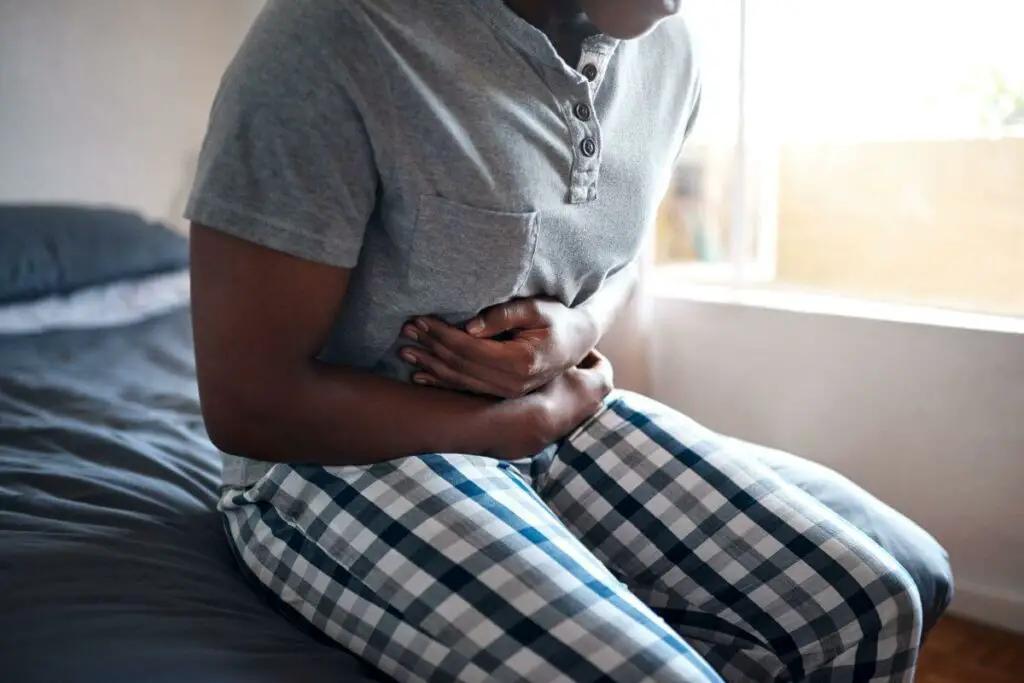
IBS management and initial treatment starts with understanding the different IBS flavors. Here are the primary ones:
- IBS-D (Diarrhea-Predominant): Feel like your life is spent in the bathroom? Welcome to IBS-D, where diarrhea is the main event.
- IBS-C (Constipation-Predominant): On the contrary, with IBS-C, you’re more likely to play a game of “When Will I Go?”
- IBS-M (Mixed): This one’s a mixtape – a blend of diarrhea and constipation, so it may really keep you on your toes.
But what unites these types are the hallmark symptoms: abdominal pain or cramping plus either constipation, diarrhea, or both.
Severity of symptoms and IBS type guide which medications are best for which person. If you’re predominantly dealing with diarrhea, for example, your doctor might consider medications that slow down gut motility.
IBS with Constipation (IBS-C) Medication Options

For patients dealing with the constipation subtype of IBS, several medications can come to the rescue.
- Linaclotide: This medication belongs to a class of drugs called guanylate cyclase-C agonists, which help increase fluid secretion in the intestines, easing bowel movements.
- Prokinetic Agents: These help the muscles in the gastrointestinal tract contract, promoting more regular and efficient bowel movements.
In addition to prescription medications, over-the-counter medicines can also provide relief:
- Magnesium hydroxide oral (also known as Phillips’ Milk of Magnesia)
- Polyethylene glycol (common brand name Miralax)
These agents work by drawing water into the intestines, softening stool and making it easier to pass.
It’s always best to consult your healthcare provider before starting any new medication or supplement to ensure its safety and effectiveness for your specific condition.
Remember, IBS with constipation may respond differently to drugs, so it might take some trial and error to find the perfect fit for you.
IBS with Diarrhea (IBS-D) Medication Options
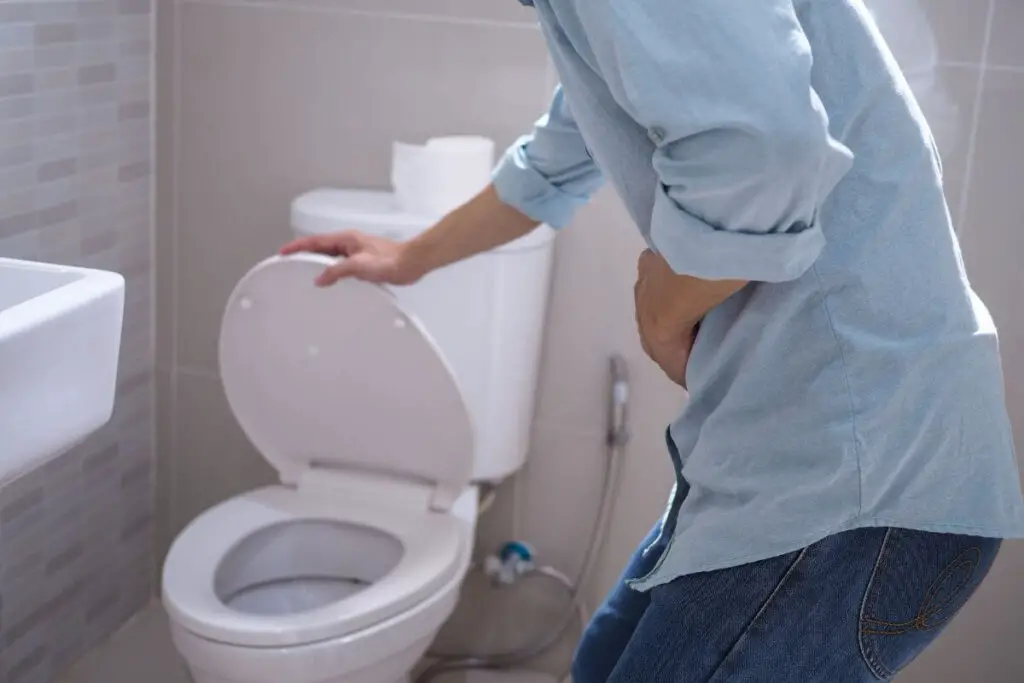
Dealing with IBS with Diarrhea can feel like you’re on a never-ending rollercoaster. But, hope is on the horizon with targeted medication options.
Here are a couple of the key prescription IBS-D medications:
- Rifaximin: Targets gut bacteria causing diarrhea. Sold under the brand name Xifaxan, it’s a leading prescription medication for IBS-D. It’s a type of antibiotic that’s not absorbed into the bloodstream but works directly in the gut to relieve symptoms.
- Alosetron: Particularly beneficial for women with severe IBS-D symptoms. It works by slowing down the movement of stools through the lower bowel.
Typically, these medications can help improve not only your diarrhea symptoms but also any associated belly pain and discomfort.
Remember, it’s vital to consult a healthcare professional who can tailor the medication to your specific symptoms and any other health conditions you may have. Always follow your provider’s instructions and be patient, as finding the right medication for you may take some trial and error.
2. Over-the-Counter (OTC) Medications for IBS Relief
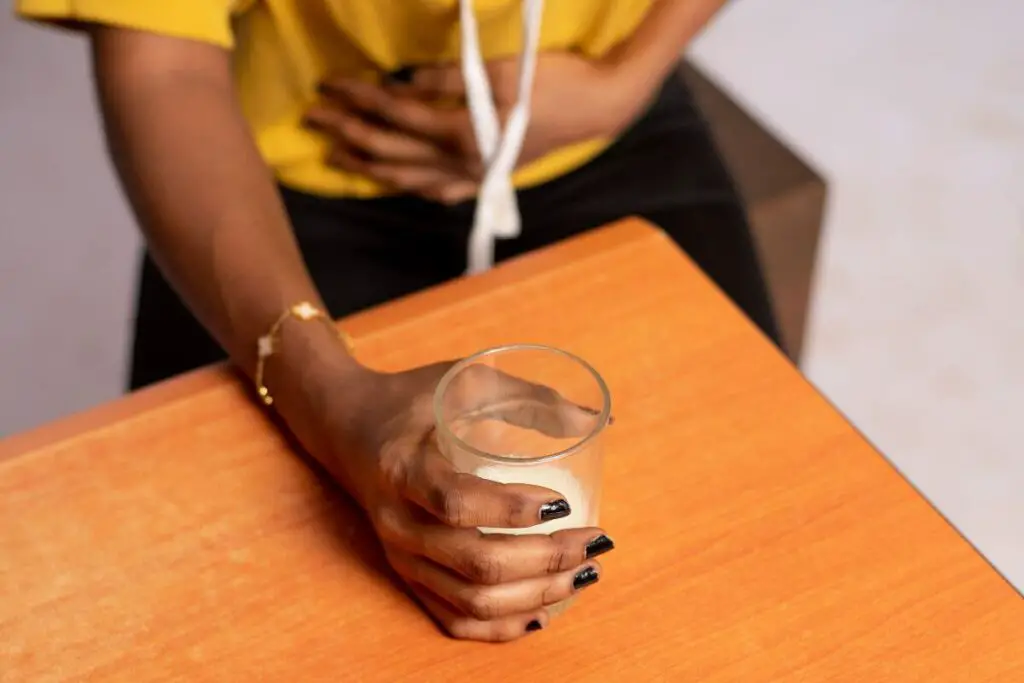
The over-the-counter (OTC) aisle can be a ray of hope for those in need of quick IBS relief. Here are some of the standouts:
- Antidiarrheal Medications: Think ingredients like loperamide (e.g., Imodium). These work by slowing down gut contractions, helping control diarrhea – a common IBS woe. After all, nobody wants to worry about locating the nearest restroom on a night out.
- Laxatives: For those struggling with constipation, gentle and natural options are key. OTC laxatives, especially those with polyethylene glycol (e.g., Miralax), can help maintain regular bowel movements.
- Bismuth Subsalicylate: This ingredient, found in products like Pepto-Bismol, has both antidiarrheal and antibacterial properties. It can be a convenient go-to for managing diarrhea and the accompanying stomach discomfort.
- Fiber Supplements: These can assist in bowel regularity. Look for options like psyllium (e.g., Metamucil) for soluble fiber that can ease both constipation and diarrhea in IBS sufferers.
OTC medications can be a great initial step in managing IBS symptoms, but always chat with your healthcare provider to ensure the best fit for your individual needs. And if you notice persistent or worsening symptoms, that’s your cue to consult your healthcare pro.
Lear more about OTC medicine for managing IBS symptoms.
3. Prescription Medications for Targeted IBS Treatment
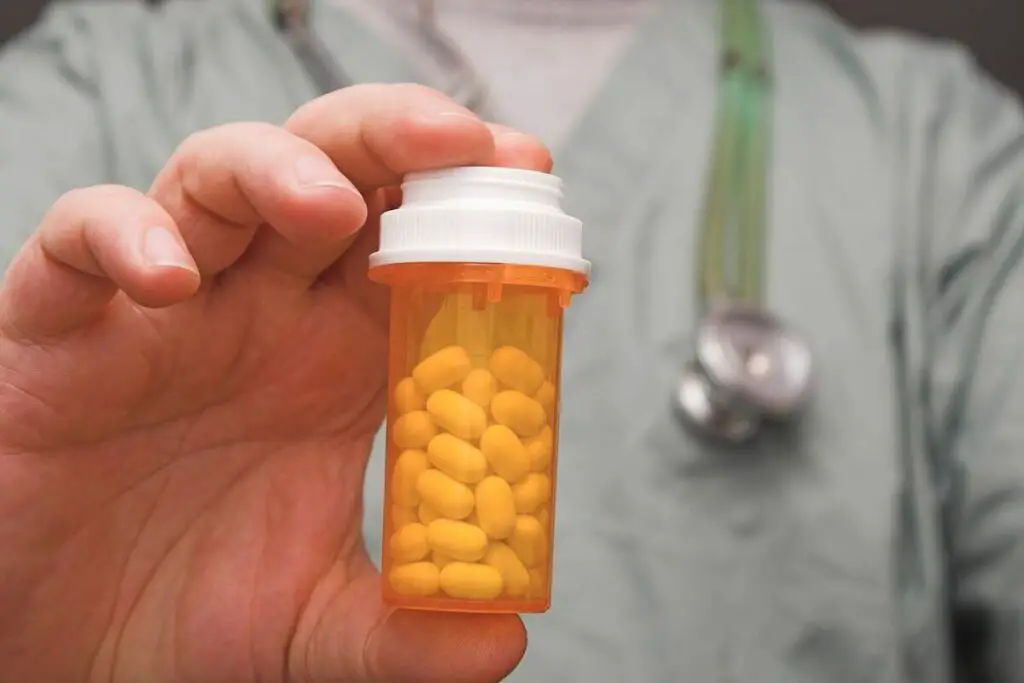
Prescription medications for IBS are designed to specifically target symptoms and underlying causes. They can be an effective option for those who haven’t found relief through lifestyle changes or OTC medications.
Understanding the key drugs in this category and how they work is essential for individuals with IBS seeking a more structured treatment plan. Let’s explore the top prescription options and how they can be used to alleviate the burden of IBS on a more targeted level.
- Antispasmodic Medications: These smooth muscle relaxant drugs are often prescribed to alleviate the cramping and abdominal pain experienced in IBS. Common antispasmodics like dicyclomine and hyoscyamine work by relaxing the muscles in the gut, providing relief from spasms and discomfort.
- Eluxadoline (Viberzi): Eluxadoline is an FDA-approved medication for IBS-D. It works by targeting specific receptors in the gut, which can help to regulate bowel function and reduce symptoms like diarrhea and abdominal pain.
- Lubiprostone (Amitiza): Often prescribed for IBS-C, lubiprostone works by increasing fluid secretion in the gut, making it easier to pass stools. It’s a great option for those who struggle with infrequent bowel movements and straining.
- Rifaximin (Xifaxan): As an antibiotic, rifaximin can be prescribed to target certain bacteria in the gut that may contribute to IBS symptoms, particularly in cases of IBS-D. It’s important to note that rifaximin isn’t a long-term solution for IBS, but it can provide short-term relief when used selectively.
- Tegaserod (Zelnorm): This medication, which was recently reintroduced to the market, is FDA-approved for women with IBS-C who haven’t responded well to other treatments. It helps to stimulate the muscles in the gut, which can relieve constipation and abdominal discomfort.
- Tricyclic Antidepressants: Although typically used for depression, low doses of tricyclic antidepressant medications like amitriptyline and nortriptyline can help regulate the central nervous system’s response to pain and manage symptoms of IBS, particularly when there’s a significant component of abdominal pain.
Always consult a healthcare provider to determine the best prescription medication for your particular type of IBS and individual needs. It’s important to recognize that while prescription medications can be incredibly effective, they may also have potential side effects, and their usage should be carefully monitored by a healthcare professional.
3.1 Antispasmodic Medications
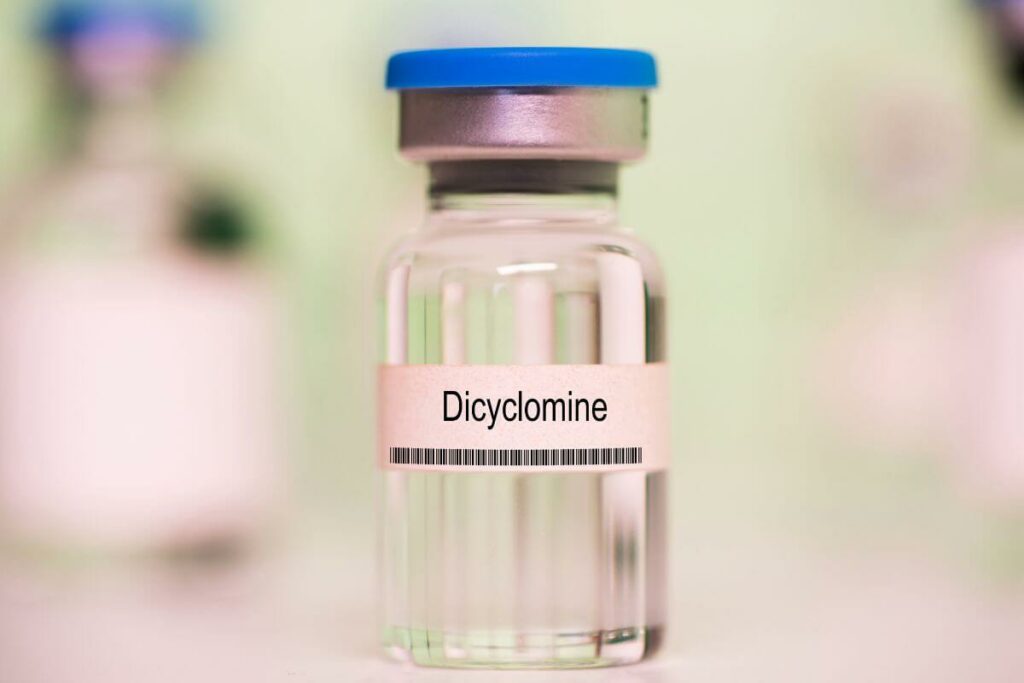
Antispasmodics are designed to be the firefighters of your gut, swooping in to extinguish flames of muscle spasms. These involuntary contractions can cause pain and bloating in people with IBS. Antispasmodic drugs work by stabilizing the muscle movements in your digestive tract, reducing the severity and frequency of spasms.
One well-known antispasmodic is Dicyclomine (Bentyl). It works by targeting the smooth muscles in your gut, controlling the unruliness that causes discomfort. The goal isn’t to paralyze your gut, but to help it regain its composure, kind of like a referee at a rowdy game.
When exploring antispasmodic options, remember that what works wonders for one person might not be as effective for another. It’s a tale as old as modern medicine: the search for the right treatment fit.
Here are some points to consider for using antispasmodic medications:
- Dicyclomine is commonly prescribed and well-tolerated, but as always, side effects can occur.
- Be patient; antispasmodics may take some time to show their full effect.
- Consult your healthcare provider if you experience severe or concerning side effects.
It’s often helpful to try different medications or even a combination of approaches to best manage IBS symptoms. Just like the detectives in a crime procedural, the more puzzle pieces you have, the better the chance of solving the case of your gut discomfort.
3.2 SSRIs and Tricyclic Antidepressants

As perplexing as it may seem, antidepressants don’t just target your mood – they can also ease the symptoms of irritable bowel syndrome (IBS) by acting on the gut-brain axis.
Selective Serotonin Reuptake Inhibitors (SSRIs) like Sertraline and Tricyclic Antidepressants like Amitriptyline, are commonly used in IBS treatment for those experiencing frequent abdominal pain and diarrhea.
They help regulate your brain’s communication with the digestive system, reducing hypersensitivity and enhancing pain tolerance in the gut. They help to manage both the physical and emotional aspects of the condition.”
If you’re considering these medications, here are some tips:
- Always consult your doctor, who can evaluate if SSRIs or Tricyclic Antidepressants are a good fit for your symptoms and overall health.
- Be patient – these medications often take a few weeks to start showing their full effect.
- Consider your mental health medication history – some SSRIs or Tricyclic Antidepressants may be contraindicated, or require dose adjustments, if you’re already taking them for mood disorders.
- Don’t just rely on medication – they should be part of a comprehensive treatment plan that also includes dietary and lifestyle changes.
3.3 Antibiotics for IBS-D
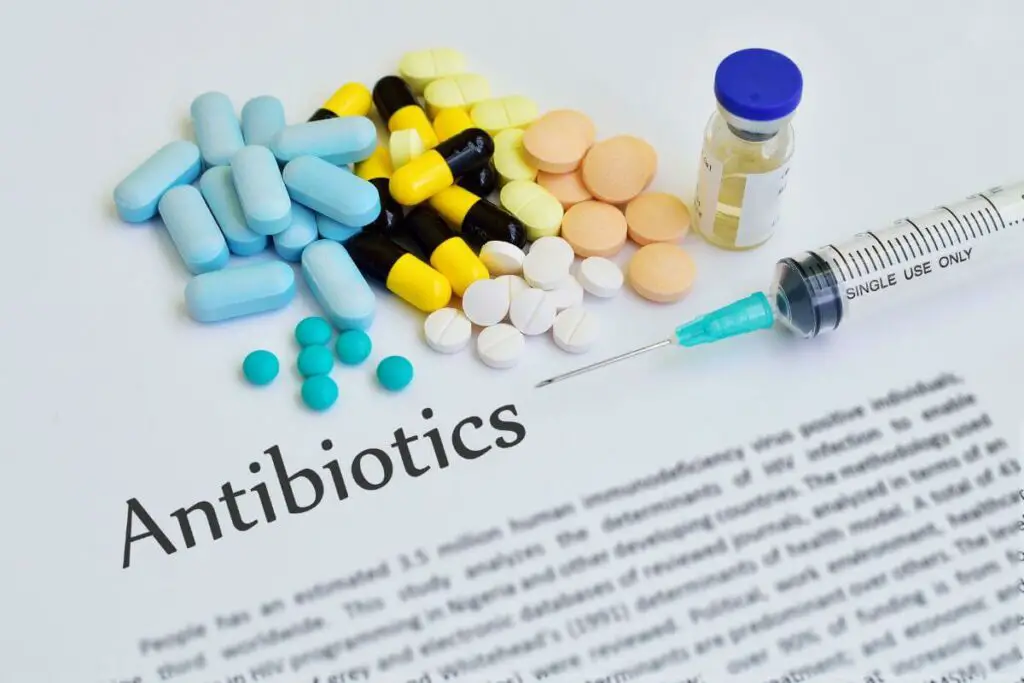
Rifaximin for Reducing Symptoms of Diarrhea-Predominant IBS
Rifaximin, a non-systemic antibiotic, has tickled the fancy of a lot of folks suffering from diarrhea-predominant irritable bowel syndrome because it effectively tackles a major player behind their tummy woes: bacterial overgrowth in the small intestine (SIBO).
Usually, there’s a balance of good and bad bacteria in our intestines, but sometimes the bad ones can get a bit too cozy, particularly in the small intestine, leading to SIBO. And that’s where Rifaximin sits up and takes charge. It targets these rebel bacteria and restricts their overgrowth.
The cherry on top is that research, like the TARGET study published in the American Journal of Gastroenterology, has shown that Rifaximin can significantly improve symptoms like stomach pain and loose stools in IBS-D, potentially resulting in a calmer, happier gut.
Here’s the lowdown:
- Selective Precision: Rifaximin mainly works in the gut, so it doesn’t affect the rest of the body as much.
- Dosing Cartwheels: A typical regimen lasts for about 2 weeks and can be repeated if symptoms persist.
- Sidekick Supplements: Some clinicians recommend probiotics alongside Rifaximin to help restore the healthy bacterial balance after the antibiotic blitz.
4. Exploring the Role of Supplements and Probiotics in IBS Management

Incorporating dietary supplements like probiotics and peppermint oil may provide added relief for some individuals with IBS.
- Learn more about Dietary Supplements for IBS Symptoms.
Whether used alone or in combination with traditional medications, these can be part of a comprehensive approach to managing irritable bowel syndrome symptoms.
- Dietary supplements, including probiotics, can play a vital role in managing IBS symptoms by restoring gut microbiota balance.
- Probiotics, often referred to as “good bacteria,” can help rebalance the intestines and alleviate some IBS symptoms.
- Good-quality probiotics have seen increased interest from gastroenterologists as a complementary therapy for IBS.
- Peppermint oil, another dietary supplement, has been shown to have a calming effect on the muscles of the GI tract, often reducing bloating and gas symptoms.
- Probiotics and peppermint oil have been researched in several studies and are generally well-tolerated.
- It’s important to consult a healthcare professional before adding or changing any dietary supplements, especially if you’re pregnant or have other health conditions.
5. Future and Alternative IBS Treatments

While current medical treatments for IBS have come a long way, researchers are continuously exploring innovative future and alternative treatments to improve IBS management.
From personalized diets and gut-focused psychotherapy to new medications and advanced probiotics, the future of IBS management looks promising.
Let’s explore these upcoming IBS treatment options and how they might help ease symptoms for those dealing with this often debilitating condition.
| Treatment Option | Description |
|---|---|
| Personalized Diets | Tailored diets based on an individual’s gut microbiome for symptom control. |
| Gut-Focused Psychotherapy | Psychological interventions targeting gut-brain axis for symptom relief. |
| New Medications | Ongoing research for medications focusing on gut hormones and pain receptors. |
| Advanced Probiotics | Advanced probiotic and prebiotic combinations for gut health improvement. |
| Microbiota Transplantation | Utilizing healthy microbiota from donors to aid in IBS symptoms relief. |
5.1 Cognitive Behavioral Therapy (CBT) and Gut-Directed Hypnotherapy

In the world of IBS management, the gut-brain axis takes center stage. Cognitive Behavioral Therapy (CBT) and Gut-Directed Hypnotherapy are treatments based on the idea that your mental and emotional state can have a profound impact on your digestive health.
- Benefits of CBT and Gut-Directed Hypnotherapy:
- Reduces stress and anxiety, common triggers for IBS symptoms.
- Helps retrain your brain and gut to work together more harmoniously.
- Can lead to long-term, sustainable symptom relief.
A study found that gut-directed hypnotherapy significantly improved IBS symptoms, with some patients experiencing relief for years. CBT, on the other hand, helps you identify and change negative thought patterns and behaviors, which can in turn alleviate IBS symptoms.
It’s important to remember that these therapies are not quick fixes. They usually require several sessions with a qualified therapist. But don’t underestimate the power of your mind in shaping your gut health. As CBT and gut-directed hypnotherapy expertly demonstrate, a healthy gut starts with a healthy mind.
Read more about Various Behavioral Therapies for IBS Symptoms.
5.2 Fecal Microbiota Transplant (FMT)
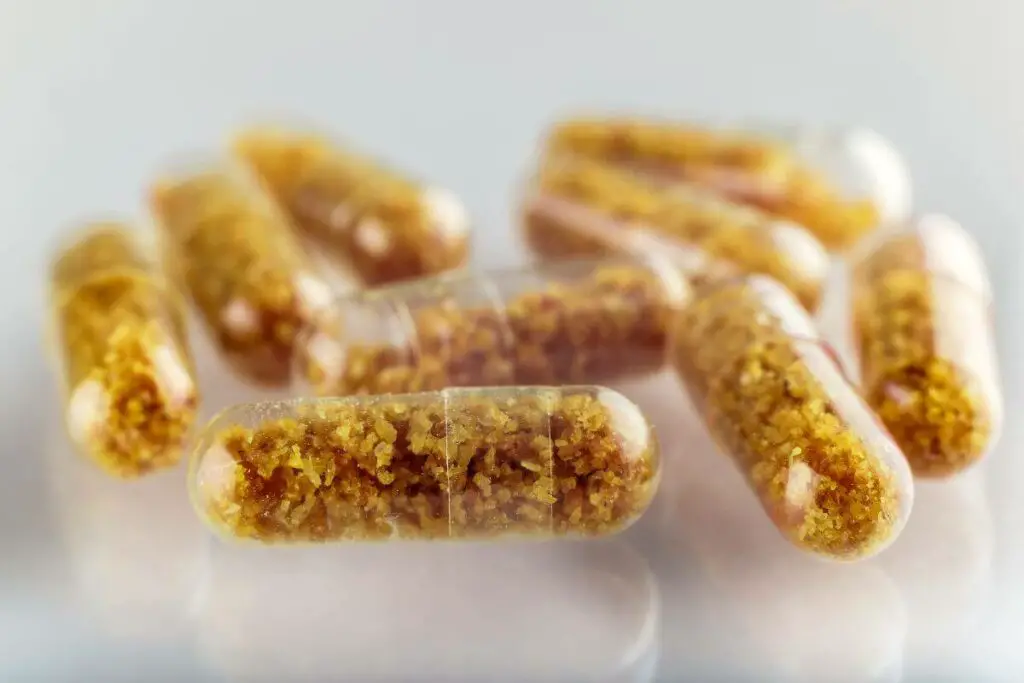
FMT, though primarily known for treating severe Clostridioides difficile infection, has shown promising preliminary results in managing IBS. The procedure involves transferring fecal matter from a healthy donor into the gut of the recipient to restore a healthy balance of gut bacteria.
Few small-scale studies have suggested that FMT could alter the gut microbiome, leading to reduced IBS symptoms. However, more extensive research is required to establish its long-term efficacy, safety, and practical application for IBS.
Some considerations concerning FMT for IBS include:
- It’s an experimental therapy mainly performed under clinical trials.
- It’s generally reserved for individuals with severe, treatment-resistant IBS.
- Risks include potential infections and unintended long-term changes in the gut microbiome.
FMT presents a novel approach to managing IBS by targeting the underlying gut microbiota, but at this stage, it’s not a standard recommendation. Always consult a gastroenterologist or healthcare provider to discuss its potential benefits and risks for your specific condition.
5.3 Diet and Lifestyle Modifications

One of the most compelling aspects of treating mild symptoms is the potential relief offered through dietary and lifestyle changes.
The Low-FODMAP diet, which targets certain carbohydrates that can contribute to IBS symptoms, and dietary fiber supplements have shown significant promise in mitigating discomfort for many individuals.
- Dive into Low-FODMAP Diet: A Low-FODMAP diet aims to reduce intake of specific fermentable carbohydrates that may trigger IBS symptoms. By gradually reintroducing higher FODMAP foods, patients can identify their individual triggers.
- Embrace Fiber: Dietary fiber supplements, particularly soluble fibers like psyllium, can alleviate constipation and, in some cases, moderate diarrhea.
- Explore Psychological Support: Cognitive behavior therapy has proven effective in addressing the mental and emotional toll of IBS, reducing stress and anxiety that can exacerbate symptoms.
- Novel Therapies: Emerging treatments such as fecal microbiota transplantation, which aims to restore a healthy gut microbiome, are under study for their potential to alleviate IBS symptoms through specialized dietary approaches.
It’s important to note that every individual’s response to dietary changes can vary. Consulting with a gastroenterologist or a registered dietitian nutritionist familiar with IBS can help tailor a plan that best suits an individual’s needs and lifestyle.
6. When to Consult a Healthcare Professional

While self-care strategies play an essential role in managing IBS, there are times when consulting a healthcare professional becomes non-negotiable. Here are the signs that suggest it’s time to engage with a physician for your IBS journey:
- Symptoms are Debilitating: It’s absolutely normal to experience discomfort and moderate symptoms with IBS, but when symptoms start affecting daily life, it’s time to seek expert help. When you see a worsening of symptoms, consult a healthcare professional.
- Unexplained Changes in Symptoms: If you notice unexpected changes in your symptoms, such as new or different types of pain, altered bowel habits, or even blood in the stool, don’t brush it off. These changes might require a fresh evaluation and possibly a different treatment approach.
- Presence of Other Health Conditions: IBS often coexists with other medical conditions like fibromyalgia, anxiety, or depression. If you have been diagnosed with any of these conditions and your IBS symptoms are affecting your overall health management, it’s important to work with your primary care physician or a gastroenterologist to determine the best course of action.
- Resistance to Over-the-Counter Treatments: If you find little to no relief from OTC medications or strategies, it’s a clear indication that supervised healthcare guidance is essential. This is particularly true for individuals with IBS-C or IBS-M who may require prescription-strength therapies or even medication adjustments.
- Persistent Symptoms: If your symptoms persist for an extended period, it’s time to seek expert help. If you experience constant bloating, abnormal bowel symptoms, and stomach discomfort, always check with your healthcare provider.
- First Diagnosis of IBS: While IBS is often diagnosed after excluding other conditions, your first diagnosis should ideally be confirmed by a healthcare professional. This is crucial to ruling out other ailments and ensuring a personalized treatment plan is devised based on your specific symptoms and medical history.
Remember, every patient’s IBS experience is unique. What works for one individual might not work for another, making professional intervention crucial for tailored and effective treatment plans.
Don’t hesitate to consult a physician or a gastroenterologist if your symptoms become severe, unmanageable with OTC treatments, undergo unexplained changes, or significantly impact your daily life. They have the expertise to guide you through different IBS therapies and find the most suitable approach for you.

Patients with IBS often face the dilemma of managing symptoms without experiencing unfriendly side effects. Common side effects of IBS medications can include bloating, gas, and nausea.
To mitigate these, lifestyle adjustments or trying different options based on your health care provider’s advice might be needed. You may also consider supplementing with natural remedies for IBS.
An essential part of navigating IBS medication side effects is open communication with your healthcare provider. If you’re experiencing uncomfortable or unexpected side effects, it’s crucial to discuss them with your doctor, even if they seem benign at first.
The goal is to find the right balance between symptom management and minimal adverse effects. Remember, treatment is a collaborative effort; your healthcare provider is your partner in achieving the best quality of life with IBS.
Final Thoughts: Optimizing IBS Management with Medications

Understanding the range of options for IBS treatment is a crucial step in managing this chronic condition. It’s not just about popping a pill and calling it a day. It’s about actively participating in your own well-being.
Stay in close communication with your healthcare provider, ask about the latest treatments and studies, and don’t be afraid to explore new ideas.
There’s no one-size-fits-all solution for IBS. So, embrace your inner health detective. Be open to lifestyle changes, dietary shifts, and psychological support in addition to medications.
It may sound overwhelming, but this isn’t the Hunger Games; you don’t have to navigate it all alone. There are registered dietitians, psychotherapists, and life coaches who specialize in gut health and can round out your care team.
So what’s the final piece of advice? Keep an open mind and a positive outlook. Your ability to manage IBS is not solely reliant on what the medicine cabinet holds, but also on your everyday choices and the support you receive. By working proactively to optimize your IBS management, life can become much more ‘normal’ for you.
- https://pubmed.ncbi.nlm.nih.gov/27528177/
- https://www.nejm.org/doi/full/10.1056/nejmoa1004409
- https://www.med.unc.edu/ibs/wp-content/uploads/sites/450/2017/10/IBS-and-Antidepressants.pdf
- https://www.ncbi.nlm.nih.gov/books/NBK534810/
- https://nyulangone.org/conditions/irritable-bowel-syndrome/treatments/medication-for-irritable-bowel-syndrome
- https://www.xifaxan.com/ibsd/about-xifaxan-ibsd/
- https://www.fda.gov/regulatory-information/search-fda-guidance-documents/irritable-bowel-syndrome-clinical-evaluation-products-treatment

